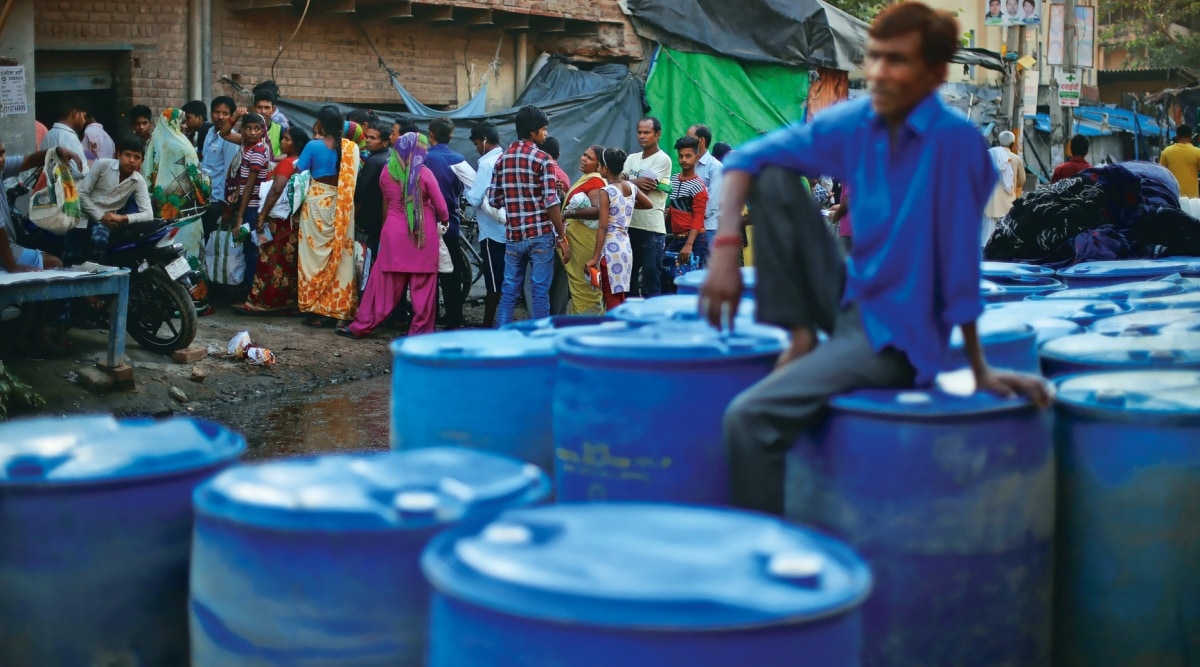 The findings from the survey suggest that close to seven in ten (69%) surveyed households have benefited from the Public Distribution System (PDS) scheme through which people get ration at subsidised cost. (Express/Oinam Anand)
The findings from the survey suggest that close to seven in ten (69%) surveyed households have benefited from the Public Distribution System (PDS) scheme through which people get ration at subsidised cost. (Express/Oinam Anand) Written by Jyoti Mishra and Chanda Rani
The central and state governments have introduced various welfare schemes targeted at the poor and the marginalised sections of society — to avail ration, pension, even gas cylinders. In part 4 of this series, Lokniti-CSDS’s study on the urban poor of Delhi tries to see the outreach of some popular welfare schemes and whether the targeted groups are indeed getting the benefits they are supposed to.
PDS, Jan Dhan Yojna
The findings from the survey suggest that close to seven in ten (69%) surveyed households have benefited from the Public Distribution System (PDS) scheme through which people get ration at subsidised cost.
Close to a quarter (23%) of households also reported that they opened their accounts under the Jan Dhan Yojna introduced by the BJP-led central government, which helped people avail the benefits of various schemes launched during Covid-19.
During the pandemic, the Pradhan Mantri Garib Kalyan Yojana was introduced, which provided Rs 500 to women having a Jan Dhan account. The study found that a mere 9% of households said they got the amount. However, if the household had a Jan Dhan account, amongst them a little over one-fifth said that they got the benefit under Pradhan Mantri Garib Kalyan Yojana.
Sixteen percent of households benefited from the pension scheme and 15% received gas cylinders under Ujjwala Yojna, a central government scheme (Table 1).
Though not many urban slum dwellers could avail the benefit of the Direct Cash Transfer by the central government under the Pradhan Mantri Garib Kalyan Yojana during Covid-19, they got other forms of assistance from the government during the pandemic.
A little over seven in ten (71%) households got free ration provided by the government and two-fifths said they received free medicines and treatment. Merely 8% of households got financial help from the government during Covid (Table 2).
Delivery, accessibility
When we look at delivery and accessibility of the welfare schemes, we found that availing these services was not very challenging for the urban poor. Nine of ten respondents said they had never paid any bribe to get the benefits of any schemes.
However, data shows that lack of proper documents became a hurdle at times in availing these services. Sixteen percent of households in the survey said that they were denied ration due to the lack of identity proof documents and 7% said that they were denied help related to medical treatment (Table 3). The government is promoting digitalisation in service delivery and encouraging people to apply online for welfare schemes.
While it was believed that it would be daunting for the poor to apply online, the data presents a positive picture, with close to a quarter of the urban poor households in Delhi saying they had applied for government services. However, one doesn’t know whether they sought help from others or applied on their own.
Data suggest that people living in Delhi’s slums are getting benefits of state welfare schemes, especially free ration or ration at subsidised cost. However, schemes such as pension and direct cash transfer under the Pradhan Mantri Garib Kalyan Yojana was not well delivered among urban poor and not many could avail its benefits.
The authors are researchers at Lokniti-CSDS, Delhi. For the study, 1,080 people spread across 55 slums covering all 11 districts of Delhi were interviewed using a structured questionnaire by means of face-to-face interview method. The interviews were conducted by trained field investigators for three months (November 2021 to January 2022).
- The Indian Express website has been rated GREEN for its credibility and trustworthiness by Newsguard, a global service that rates news sources for their journalistic standards.

